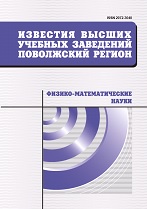|
Mathematics
Building a finitely generating system in a group of Kalmar-elementary permutations
S. S. Marchenkov
Lomonosov Moscow State University, Moscow
Abstract:
Background. Over 30 years ago, at the interface of the theory of recursive functions and the theory of groups there was formulated a problem of finite generation of some large groups of recursive permutations, associated with classes of the Grzegorczyk hierarchy. This problem was successfully solved by S. A. Volkov in 2008. S. A. Volkov's solution was technically quite complicated and used a series of facts, the solution of which required considerable efforts of many mathematicians. Despite the fact that stages of proving were separately published, so far there has been no independent description that doesn't require addressing other statements and sources. The aim of this work is to describe all stages of obtainment of S.A. Volkov's theorem by the example of a group of Kalmar-elementary permutations. Besides, the study is also aimed at explicitely defining all ermutations (total amount - 22) that generate the group under consideration. This creates preconditions for analyzing number-theoretic, algebraic and recursive-theoretic properties of permutations from a sufficiently broad and representative group of Kalmar-elementary permutations. Materials and methods. In the study the author used recursive-theoretic, algebraic and combinatorial methods. Results and conclusions. The author described (without proving) three stages of S.A. Volkov's theorem obtainment. All side results, occurring while using the results of different authors, were deleted. For the first stage (superposition construction of finite bases in the K function Kalmar-elementary class) the researcher considered the whole path - from A. Grzegorczyk's formaulation of the problem in 1953 till obtainment of the “final” result in 2006. The second stage (superposition construction of finite bases in the class of all one-place functions from K ) was described with proving, prepared specifically for the present work. The third stage (construction of the finite generating system in the $G_K$ group of all permutation from the K class) generally follows the original work of S.A. Volkov.
Keywords:
Kalmar-elementary permutations, finitely presented permutation group.
Citation:
S. S. Marchenkov, “Building a finitely generating system in a group of Kalmar-elementary permutations”, University proceedings. Volga region. Physical and mathematical sciences, 2016, no. 2, 13–26
Linking options:
https://www.mathnet.ru/eng/ivpnz241 https://www.mathnet.ru/eng/ivpnz/y2016/i2/p13
|

| Statistics & downloads: |
| Abstract page: | 45 | | Full-text PDF : | 18 | | References: | 18 |
|




 Contact us:
Contact us: Terms of Use
Terms of Use
 Registration to the website
Registration to the website Logotypes
Logotypes








 Citation in format
Citation in format 